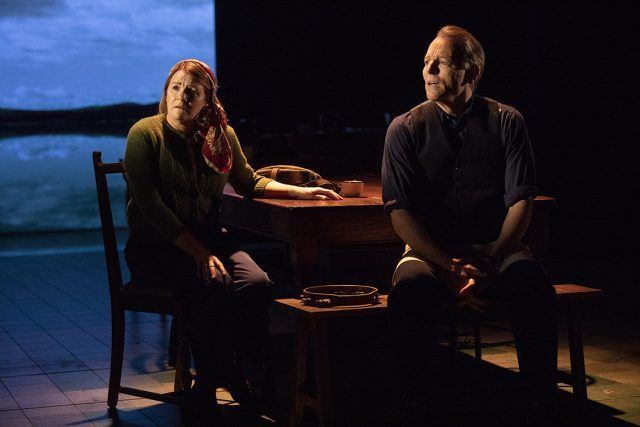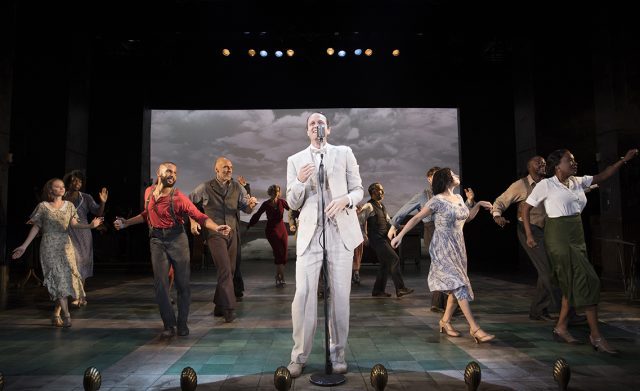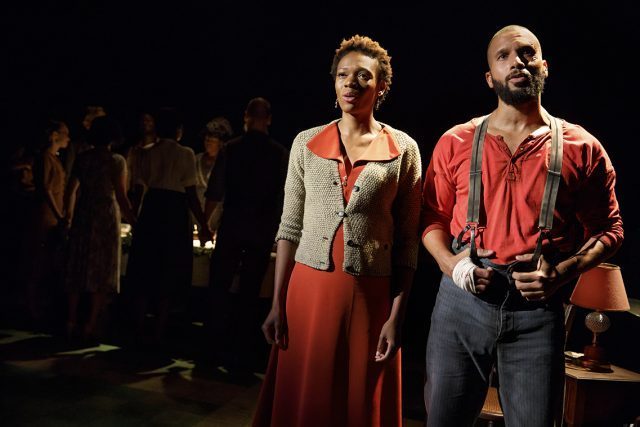
Mare Winningham and Stephen Bogardus play a married couple facing multiple dilemmas in Girl from the North Country (photo by Joan Marcus)
The Public Theater, Newman Theater
425 Lafayette St. by Astor Pl.
Tuesday – Sunday through December 23, $120
212-967-7555
www.publictheater.org
Conor McPherson’s Girl from the North Country is like a grand, epic Bob Dylan song brought to life — think “Desolation Row,” “Stuck Inside of Mobile with the Memphis Blues Again,” “Lily, Rosemary, and the Jack of Hearts,” and “Brownsville Girl” (which he wrote with playwright Sam Shepard). It’s long (about two and a half hours), it has multiple key characters and subplots, and it’s not always clear exactly what’s going on. The show, which has been extended through December 23 at the Public’s Newman Theater, is also deeply involving, honest, and poetic. The elegiac story is a flashback to the iron-ore shipping town of Duluth, Minnesota, in the winter of 1934, where Dylan was born Robert Zimmerman seven years later. It’s set in a failing guesthouse run by Nick Laine (Stephen Bogardus), a kind soul who is taking care of his mentally ill wife, Elizabeth (Mare Winningham), and their troubled twenty-year-old biological son, Gene (Colton Ryan), who can’t commit to a job or his ex-girlfriend, Kate Draper (Caitlin Houlahan). The white couple also has a bright and lovely nineteen-year-old adopted black daughter, Marianne (Kimber Sprawl), who is pregnant.
Among those staying at the guesthouse — skillfully designed by Rae Smith, who also did the period costumes — are stalwart businessman Frank Burke (Marc Kudisch), his wife, Laura (Luba Mason), and their on-the-spectrum grown son, Elias (Todd Almond); Mrs. Neilsen (Jeannette Bayardelle), a recent widow who is having an affair with Nick and waiting on money from her late husband’s estate; and Bible salesman Reverend Marlowe (David Pittu) and formerly incarcerated boxer Joe Scott (Sydney James Harcourt), who arrive together. Determined to find a spouse for Marianne, Nick has invited sixty-nine-year-old shoe mender Mr. Perry (Tom Nelis) to come over and offer his hand to her. Dr. Walker (Robert Joy) serves as an Our Town–like narrator. “My name is George Arthur Walker. I’m a doctor. Least I was. Back when this was our world,” he says at the beginning. “I healed some bodies in pain. But as we know pain comes in all kinds. Physical, spiritual. Indescribable.”

Elias Burke (Todd Almond) takes center stage for a surreal version of “Duquesne Whistle” in Dylan musical at the Public (photo by Joan Marcus)
Two-time Tony nominee McPherson (Shining City, The Seafarer), who wrote and directed the production, does a marvelous job incorporating songs from throughout Dylan’s wide-ranging fifty-plus-year career, selecting well-known favorites (“Like a Rolling Stone,” “Idiot Wind”) along with lesser-known gems (“Went to See the Gypsy,” “Tight Connection to My Heart [Has Anyone Seen My Love?”], “True Love Tends to Forget”). The characters and plot elements are not taken directly from Dylan songs; instead, they add depth to each other, creating a compelling mood and atmosphere of 1930s America, a time when many a dream died hard. (It’s actually a little disappointing when Scott starts singing “Hurricane,” Dylan’s ode to wrongly imprisoned black boxer Rubin “Hurricane” Carter, as it’s the only predictable musical moment of the show.) The music also exists in a different period of time and space than the narrative; the songs are sung by the actors out of character, at a microphone, as the rest of the cast carries on in the background.

Kimber Sprawl and Sydney James Harcourt team up for a duet in Conor McPherson’s Girl from the North Country (photo by Joan Marcus)
Among the musical highlights are Winningham delivering a stunning reimagining of “I Want You”; several performers joining in for a soulful medley of “Slow Train” and “Jokerman”; and a rousing rendition of “You Ain’t Goin’ Nowhere” that brings the house down to start the second act. Nearly every song has been significantly rearranged by orchestrator and music supervisor Simon Hale with McPherson, which works exceptionally well and makes sense, since Dylan has been reinventing his tunes for decades, often rendering them nearly unrecognizable (which you can hear for yourself when Dylan and his band come to the Beacon Theatre November 23 to December 1). It’s all played with heart by a four-piece band situated in a far corner, consisting of music director Marco Paguia on piano and harmonium, Ross Martin on guitar, Martha McDonnell on violin and mandolin, and Mary Ann McSweeney on bass (with various actors occasionally sitting at the drum kit at the front of the stage). The ensemble also features Matthew Frederick Harris, John Schiappa, Rachel Stern, and Chelsea Lee Williams, who play minor characters and sing. Girl from the North Country is a haunting look at America’s past — and future, perhaps? — from two extraordinary storytellers.